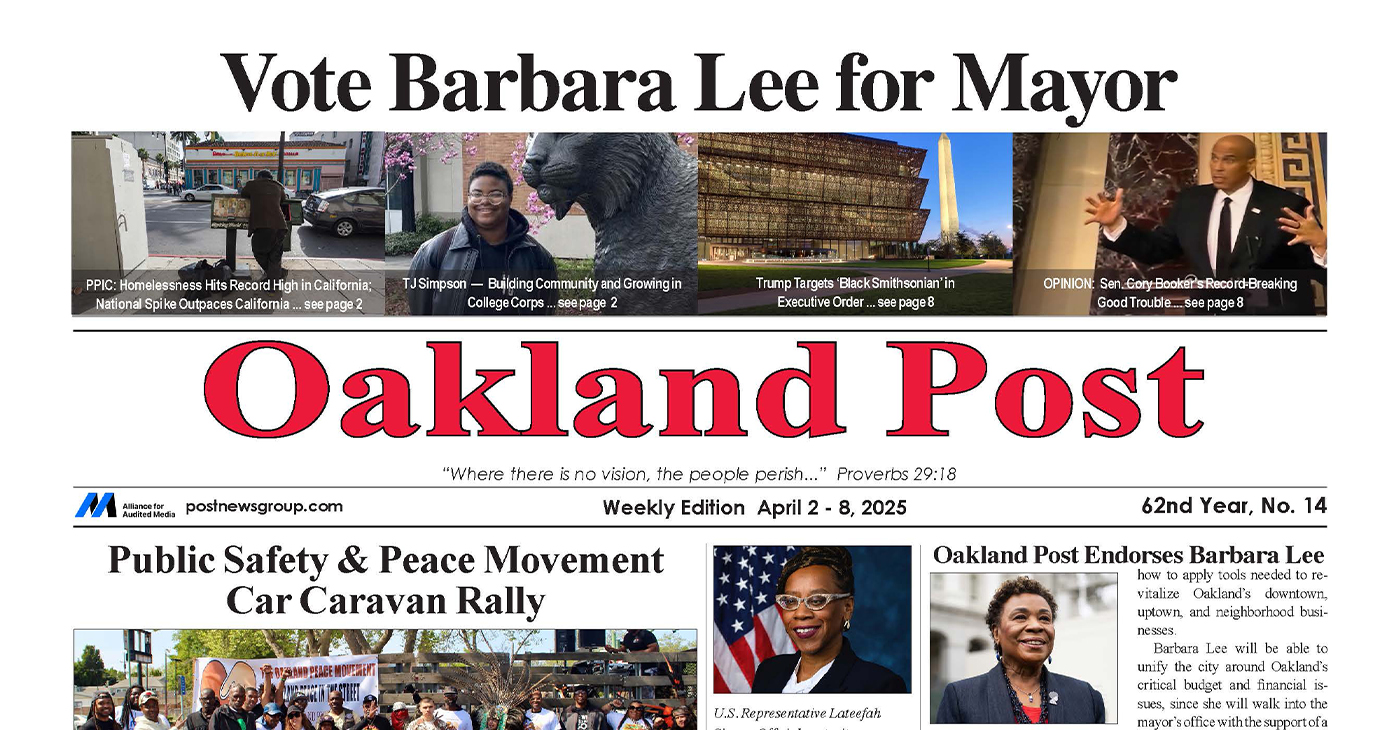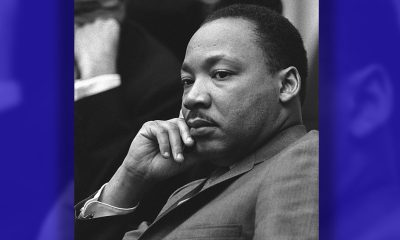Community
Hundreds Defend ‘Afrika Town’ Community Garden
Over 300 community members in support of a community garden in West Oakland recently participated in a performance event to protect the garden from destruction.
The “Afrika Town” Garden sits on a lot on San Pablo Ave., at 23rd and Brush streets in West Oakland, just blocks from the Uptown district in downtown Oakland.
A year ago, the vacant lot reeked of urine and was littered with trash and syringes. Today, more than a dozen garden beds filled with fruits and vegetables provide fresh food to anyone who asks within an impoverished food desert.
On April 3, a day billed as ‘Liberation Day,’ the Afrika Town garden lot featured live poetry and musical performances, a “Know Your Rights” workshop by Oakland’s Copwatch, and a children’s jumper. Hundreds attended throughout the day in solidarity with the vision for an Afrika Town in Oakland.
Last fall, volunteers at Qilombo–a social center adjacent to the lot–cleaned up the lot and collaborated with Planting Justice and college students to plant vegetables to feed the community.
Back in February, organizers painted blocks on the sidewalk red, black and green, and hoisted banners on San Pablo Ave. that read, “Karibu, Afrika Town,” Swahili for welcome. Afrika, spelled with a k, is also a Swahili term.
On March 7, hundreds came to the garden and painted a large “Afrika Town” mural on the side of Qilombo’s building. It features Black Panthers, Kwame Nkrumah, and other artwork inspired by the liberation movement. The colorful mural not only attracted the approving eye of residents, activists say, but also the attention of developers.
On March 26, the current property owner, Noel Yi, along with his realtor Gary Robinson, came with Oakland Police and demolition equipment with an intent to destroy the garden. Afrika Town volunteers stood between bulldozers and the lot’s fence to prevent the uprooting of the garden.
After negotiations, the owner agreed to give volunteers one week to dig up the beds before the bulldozers would return.
Instead of removing the fruits and vegetables, lead volunteer Linda Grant and others organized to defend the garden.
“We want this to be a resource for the community,” said Danae Martinez, a community college professor of African American Studies at Laney and Merritt Colleges. Her students helped plant the garden and paint the mural. “We want it to be for Black people and about Black people.”
The garden is just a seed for Afrika Town, envisioned as an autonomous zone for Black people.
“A lot of other races and cultures have a designated space, like Chinatown, or Fruitvale, or Hills for the White folks,” said Emani Alyce, a volunteer at Qilombo. “Afrika Town is a space where Black folks can come and feel comfortable with.”
After lobbying from activists and supporters, and a call from Oakland City Councilwoman Lynette Gibson, Yi and Robinson agreed to work with Afrika Town’s gardeners.
Despite the small victory, volunteers are still concerned with gentrification, particularly the West Oakland Specific Plan. Abiola said, “We had a small victory today. It’s nowhere near over.”
#NNPA BlackPress
Lawmakers Greenlight Reparations Study for Descendants of Enslaved Marylanders
BLACKPRESSUSA NEWSWIRE — Maryland lawmakers have approved Senate Bill 587, authorizing the creation of the Maryland Reparations Commission.

By Stacy M. Brown
BlackPressUSA.com Senior National Correspondent
Maryland lawmakers have approved Senate Bill 587, authorizing the creation of the Maryland Reparations Commission. The body will study and make recommendations for reparations to descendants of enslaved people and others harmed by centuries of discriminatory policies. The legislation now awaits the governor’s signature and is scheduled to take effect July 1, 2025. The commission will examine Maryland’s long history of slavery, the economic and social systems that benefited from it, and the lingering impacts of those institutions. Its work will include recommendations on financial compensation, housing and business support, tuition waivers, and other forms of restitution. “This commission is not only about acknowledging our past – it’s about using that understanding to pave the way for a more equitable and fair future,” said Del. Jheanelle Wilkins, Chair of the Legislative Black Caucus of Maryland, which made reparations a top priority for the first time this legislative session.
From its founding in 1634 until the abolition of slavery in 1864, Maryland was a society built on slave labor. Tobacco, the colony’s staple crop, fueled economic growth and political dominance for the state’s elite. By the mid-18th century, nearly one-third of Maryland’s population was enslaved. Skilled and unskilled laborers like Frederick Douglass, who caulked ships in Baltimore, contributed to the state’s prosperity under brutal conditions. The legacy of that bondage continued to echo across generations. Del. Aletheia McCaskill, the lead sponsor of the House version of the bill, said the measure lays the groundwork for redress. “I am overjoyed at the passage of this monumental legislation,” McCaskill said. “This commission will gather historical evidence, examine present-day disparities, and provide a data-driven framework to acknowledge past harms. By recommending policies and developing solutions to repair the damage done, we can take meaningful steps toward true equity in our state.”
Sen. C. Anthony Muse, sponsor of the Senate version, called the passage historic. “We took a historic step towards justice and healing for our communities,” Muse remarked. “The passage of Maryland Senate Bill 587 marks a significant commitment to addressing the long-lasting effects of slavery and systemic inequities.” The commission’s membership will include lawmakers, historians, HBCU scholars, civil rights experts, representatives from the NAACP and the Maryland Black Chamber of Commerce, and members of the public. It will examine reparations programs in other states and recommend procedures for verifying eligibility and the feasibility of funding and distributing reparations. Maryland’s history makes it a powerful setting for this initiative. The state witnessed the forced transport of nearly 100,000 Africans during the 18th century. The rise of tobacco plantations led to a devastating regime marked by family separation, disease, forced labor, and systemic brutality. Enslaved individuals in Maryland built canals, smelted iron, and helped fuel the economic engine of the state while living under constant threat of sale or violence. The stories of individuals like Hillery Kane at Sotterley Plantation and Lucy Jackson at Hampton Mansion reveal not only the cruelty of slavery but also the resilience and resistance of the enslaved.
By the 19th century, Maryland became a central player in the domestic slave trade, with an estimated 20,000 people sold to cotton plantations in the Deep South between 1830 and 1860. Even after emancipation in 1864, freed Black Marylanders faced decades of disenfranchisement, segregation, and economic exclusion. “This is about more than history,” Wilkins said. “It’s about how that history has shaped the realities of today.” The commission will submit a preliminary report by January 1, 2027, and a final report by November 1, 2027. It will explore possible sources of funding, such as businesses and institutions that benefited from slavery and discriminatory government practices.
Opposition to the bill has centered mainly on its cost, but the fiscal note details only a modest increase of $54,500 in 2026 to fund contractual staff. No reparations payments are authorized under the current bill. Maryland is joining California, Colorado, Illinois, Massachusetts, and New York in forming a reparations commission. The move comes as diversity, equity, and inclusion initiatives face increasing national scrutiny and political attacks. Still, supporters of the commission insist the time for reckoning is now. “We’re not just commemorating the past,” McCaskill said. “We are charting a course toward justice, informed by our truth and grounded in our responsibility to future generations.”
#NNPA BlackPress
Harris, Obama, and Booker Step Up as Resistance Against Trump Takes Shape
BLACKPRESSUSA NEWSWIRE — Obama, meanwhile, broke his silence during an appearance at Hamilton College in New York, offering one of his sharpest public critiques yet of Trump’s second administration.

By Stacy M. Brown
BlackPressUSA.com Senior National Correspondent
Is the resistance finally taking form?
As Kendrick Lamar asked during his powerful Super Bowl performance, “Are we really about to do it?” That question now echoes in the political arena as former President Barack Obama and former Vice President Kamala Harris have entered the public fray, joining voices like New Jersey Sen. Cory Booker and Texas Rep. Jasmine Crockett in confronting President Donald Trump and his administration’s sweeping changes head-on. After months of relative silence following her defeat to Trump last November, Harris returned to the spotlight Thursday during a rare appearance at the Leading Women Defined conference at a seaside resort in Dana Point, California. According to The Los Angeles Times, she didn’t mention Trump by name but spoke forcefully about the anxiety many Americans are experiencing under his new administration.
“There is a sense of fear that is taking hold in our country, and I understand it,” Harris said. “These are the things that we are witnessing each day in these last few months in our country, and it understandably creates a great sense of fear. Because, you know, there were many things that we knew would happen, many things.” “I’m not here to say, ‘I told you so,’” she continued. “I swore I wasn’t going to say that.” The appearance marked a shift in tone for Harris, who has been weighing a potential run for governor of California in 2026 or waiting until 2028 for another shot at the presidency. Still, she clarified that her political silence hasn’t equated to surrender. “We can’t go out there and do battle if we don’t take care of ourselves and each other,” Harris told the crowd. “I’ll see you out there. I’m not going anywhere.”
Obama, meanwhile, broke his silence during an appearance at Hamilton College in New York, offering one of his sharpest public critiques yet of Trump’s second administration. He condemned Trump’s attempts to reshape the federal government, stifle dissent, and punish those who oppose his policies. “So, this is the first time I’ve been speaking publicly for a while,” Obama said. “I’ve been watching for a little bit.” “Imagine if I had done any of this,” Obama added. “It’s unimaginable that the same parties that are silent now would have tolerated behavior like that from me or a whole bunch of my predecessors.” While calling Trump’s proposed tariffs bad for America, Obama said his larger concern lies with what he described as the White House’s alarming overreach.
“I’m more deeply concerned with a federal government that threatens universities if they don’t give up students who are exercising their right to free speech,” he said. “The idea that a White House can say to law firms, if you represent parties that we don’t like, we’re going to pull all our business or bar you from representing people effectively. That kind of behavior is contrary to the basic compact we have as Americans.” Obama, who campaigned for Harris during the final stretch of the 2024 election, had warned that a second Trump term would endanger the nation’s democratic norms. “Just because [Trump] acts goofy,” Obama said at the time, “doesn’t mean his presidency wouldn’t be dangerous.” With Trump’s second term underway, the voices of resistance are growing louder.
Sen. Cory Booker added fuel to the movement by making history on the Senate floor. He delivered a 25-hour, 5-minute filibuster that broke the record previously held by segregationist Sen. Strom Thurmond. Thurmond’s 1957 filibuster—lasting 24 hours and 18 minutes—was aimed at blocking the Civil Rights Act. Booker used his record-breaking speech to denounce what he called a deliberate dismantling of government at the hands of Trump, Elon Musk, and Congressional Republicans. “It always seemed wrong,” Booker said, referring to the Senate room still named after Thurmond. “It seemed wrong to me when I got here in 2013. It still seems wrong today.”
The New Jersey senator, a descendant of both enslaved people and slave owners, framed his marathon speech as a moral plea, reading letters from Americans affected by deep cuts and policy threats to Medicare, Medicaid, Social Security, and SNAP. “This is a moral moment,” Booker declared. “It’s not left or right; it’s right or wrong.” With Booker’s record-setting stand, Harris’s reemergence, and Obama’s warning shots, what once felt like fragmented frustration among Democrats may now be coalescing into something more deliberate: a resistance that is finally, visibly, on the move. “I’ll see you out there,” Harris said. “I’m not going anywhere.”
Activism
Oakland Post: Week of April 2 – 8, 2025
The printed Weekly Edition of the Oakland Post: Week of April 2 – 8, 2025

To enlarge your view of this issue, use the slider, magnifying glass icon or full page icon in the lower right corner of the browser window.
-

 Activism2 weeks ago
Activism2 weeks agoWe Fought on Opposite Sides of the Sheng Thao Recall. Here’s Why We’re Uniting Behind Barbara Lee for Oakland Mayor
-

 #NNPA BlackPress2 weeks ago
#NNPA BlackPress2 weeks agoRev. Dr. Jamal Bryant’s Black Church Target Boycott Mobilizes 150,000
-

 Activism4 weeks ago
Activism4 weeks agoOakland Post: Week of March 5 – 11, 2025
-

 Activism3 weeks ago
Activism3 weeks agoSan Francisco Is Investing Millions to Address Food Insecurity. Is Oakland Doing the Same?
-

 #NNPA BlackPress2 weeks ago
#NNPA BlackPress2 weeks agoRecently Approved Budget Plan Favors Wealthy, Slashes Aid to Low-Income Americans
-

 #NNPA BlackPress4 weeks ago
#NNPA BlackPress4 weeks agoTrump Moves to Dismantle Education Department
-

 #NNPA BlackPress4 weeks ago
#NNPA BlackPress4 weeks agoFighting to Keep Blackness
-

 Activism2 weeks ago
Activism2 weeks agoFaith Leaders Back Barbara Lee for Mayor, Criticize Candidate Loren Taylor for Dishonest Campaigning


















































